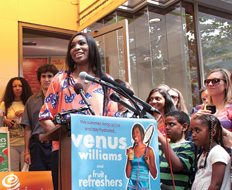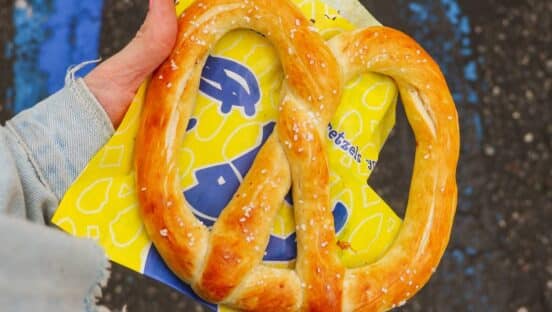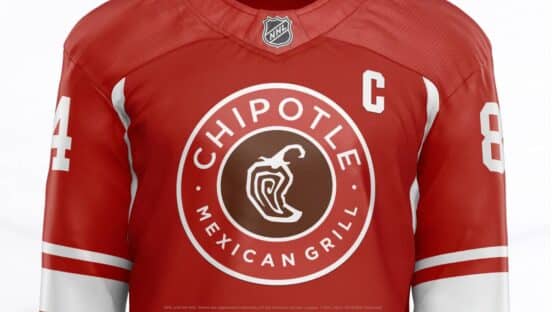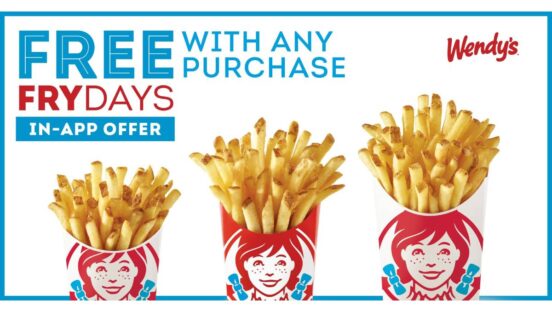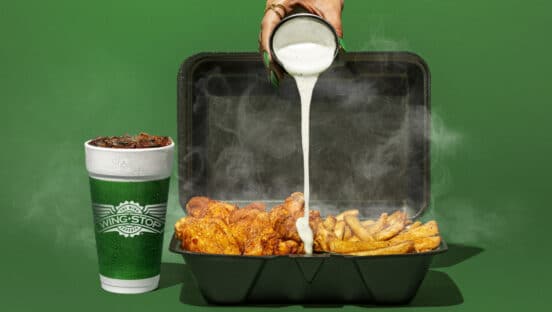Jamba Juice’s menu items, from its juices and smoothies to its oatmeal and wraps, are something of a healthy trifecta: They’re low in calories and fat, high in nutrients like Vitamins A and C, and contain fresh ingredients like fruits and vegetables.
But in the last few years, the 23-year-old Emeryville, California–based brand has worked on adding a new dimension to its position as a healthy quick serve. The company has invested more heavily in brand partnerships and marketing promotions that communicate and encourage a healthy, active lifestyle among existing and potential customers.
“For us, this is a two-part story: It’s about what you [eat] and us playing at least a small role in helping consumers think about healthier lifestyle activities, whether it’s biking or running or getting up and moving around,” says James White, Jamba Juice president, chairman, and CEO.
The ways in which Jamba Juice has associated itself with a healthy lifestyle message defy a dilemma that many quick-service concepts have stumbled upon in their efforts to help reverse climbing obesity rates. For years, healthy has been synonymous with tasteless, even as health and wellness have become trendy across the U.S. This has led many brands to avoid mass marketing of health-based initiatives for fear they will repel potential consumers.
Now, however, more brands are trying to embody healthiness in their branding and promotions, as part of a broader social ethos they hope will set them apart from the quick-service pack.
For its part, Jamba Juice is attempting to modernize the idea of healthy so that it doesn’t just suggest nutritious menu offerings.
“If you take the purist approach, many people would say health equals science. So you think of a lab coat, and it’s going to be healthy because there’s a medicinal orientation to it,” says Julie Washington, chief brand officer for Jamba Juice. “What we’re saying is the broader landscape that consumers are now engaging in is health and wellness, which is a more holistic place for us all to engage in. So that could look like many different categories and products, and not just one thing.”
Jamba Juice’s healthy messaging initiatives have indeed been many and different. The company’s Jamba CARES social responsibility platform has focused on promoting health in schools and communities through a number of programs and events. White says a February 2010 event that set a Guinness World Record for the most simultaneous jump-ropers (85,000 jumpers in 500 locations across California) was “at the start of this idea for us to try to do something bigger that would have a much greater impact.”
The company had one of the biggest stages in the world when it partnered with the White House and National Geographic Kids magazine on a 2011 event in which the record for most people doing jumping jacks in a 24-hour period was set (about 300,000 across the globe). But it was the July 2011 launch of Jamba Juice’s “Team Up for a Healthy America” initiative that brought to head many of the brand’s healthy lifestyle programs.
Through “Team Up for a Healthy America,” people are invited to sign up on a specially designated website (myhealthpledge.com) and participate in weekly health pledges like “Take a 15-minute walk once a day” or “Eat a healthy breakfast.” For every pledge, Jamba Juice donates $1 toward the purchase of athletic equipment for schools across the U.S.
“We know, in order to truly have the most robust health and wellness plan, it requires activity,” Washington says. “That’s usually at the root cause of obesity, is that people are not moving. They’ve become very sedentary. So that’s what ‘Team Up’ does. … It’s our way to getting everyone moving with something that’s very simple, and you can get other people engaged, you can get your family engaged.”
Jamba Juice has partnered with a number of sports representatives on “Team Up for a Healthy America,” including the WNBA, tennis star Venus Williams, the NBA’s Golden State Warriors, and USA Water Polo. Williams, who is also a D.C.-based Jamba Juice franchisee, is the spokeswoman.
“From an activation perspective, all the things that we do, whether it’s with folks from the WNBA or Venus Williams, are in things that make perfect sense for them and it always relates to either young people or healthy activity or lessons that they’ve learned on good nutrition and physical fitness,” White says.
Jamba Juice’s efforts have extended beyond encouraging physical activity. In 2009, the company launched efforts to fund gardening education programs across the U.S. with the “It’s All About the Fruit and Veggies” Grant Award Program. In 2012, the company awarded 20 grants in conjunction with the National Gardening Association to youth gardening programs.
“For us it’s about healthy community, so it really emanates from an individual store that sits and lives in an individual community,” White says. “The way we think about it is anything that we can do that helps people be more active, that helps people be more exposed to more fresh fruits and vegetables, that’s a clear connection to who we are as a company.”
[pagebreak]
Two smaller Chicago-based quick serves have similarly found that community initiatives can help promote a brand as health-conscious.
Roti Mediterranean Grill, a fast casual with locations in Chicago and Washington, D.C., lets customers choose among a range of healthier ingredients to construct their own Mediterranean dishes. But Peter Nolan, Roti’s director of marketing, says simply serving healthy dishes and including menu transparency in the store does not make a company health conscious. That’s why the company has partnered with Common Threads, a program that teaches low-income, inner-city kids—as well as their families—how to shop for and cook healthy foods.
“We really like the idea at Roti of getting beyond our customer base. If you want to do something good, a lot of times you’ve got to go beyond where you currently are,” Nolan says. “These folks are working in the inner city, and we don’t have restaurants in the inner city—we won’t for a while—but that’s still part of our community.”
To help support Common Threads, Roti has hosted cooking education events and raised money through various in-store promotions. The fast casual is even considering using Common Threads to help develop new kids’ menu items.
“As a brand, it helps us fulfill our mission, first of all, to help create a healthier world. And it puts our money where our mouth is a little bit,” Nolan says. “But I don’t really think we’re into it just because it’s a marketing ploy or something. It’s inner city kids in Chicago—it’s not our target market. … Even if a small percentage of [our customer base] get involved, then the ultimate impact of what we’re doing with Common Threads, helping kids be healthier—it’s exponential what we can do.”
Hannah’s Bretzel is another Windy City fast casual with deep ties to community initiatives that educate kids on the importance of healthy living.
The four-unit sandwich concept invests in several strategies that make it a “responsible business,” founder Florian Pfahler says, including making improvements with its employees, vendors, suppliers, and the environment. But it’s the company’s partnership with the Academy for Global Citizenship on the South Side of Chicago that Pfahler says is its “most heartfelt” initiative.
The brand donates time and resources to the academy, which teaches a responsible, global lifestyle to kids. The school grows its own organic food on its grounds and teaches kids how to raise and eat healthier foods. Hannah’s also donates money; during a recent promotion, the stores donated 25 percent of proceeds— Pfahler hoped about $10,000—to the academy.
“Health is not only limited to the food intake, but it’s also how we interact with the community and what kinds of resources we apply to the business and how we use resources to go about our business,” he says.
Like Nolan, Pfahler says efforts like these that benefit the community and teach health and wellness are the right thing to do. But he says there are tangible benefits for brands like Hannah’s Bretzel, Roti Mediterranean Grill, and Jamba Juice that invest in these programs.
“I think that loyalty to a brand is not only based on, ‘Is the food good and does it cost X amount of money?’” he says. “I think it goes deeper with human beings. It goes into likes and dislikes. And I think the more brand benefits you display with transparency and authenticity, the deeper the loyalty to the brand will grow over the years.”
Warren Ellish, president and CEO of Ellish Marketing Group, says brand associations built on health and wellness can be profitable so long as they are authentic and true to the overall brand message.
“If these things that you’re tying into support those points of difference that are important to the customers that you have, then those types of initiatives are going to resonate very, very strongly in the communities and the trade areas where your restaurants are,” Ellish says. “But if all of a sudden it’s something that’s totally disconnected and people just see that you’re trying to do it to score a point or tie in with the latest fad or whatever it might be, I’m not sure you’re going to get any long-term benefit out of it.”
Ellish also believes inhabiting a healthy brand message can be difficult for established brands, especially those that don’t specialize in more nutritious menu offerings. He says newer brands like Hannah’s and Roti, which are built around the ideas of health and wellness, have an easier job selling consumers on their initiatives.
Fred LeFranc, president of restaurant and hospitality consultancy Results Thru Strategy and board member for foodservice nutrition consultant Healthy Dining Finder, says companies shouldn’t make health and wellness their primary brand message unless it’s the core of the business.
“What we’ve seen while talking with clients of Healthy Dining is that no one really makes a giant campaign about health in and of itself,” he says. “They still have to wrestle with the fact that people are looking for value—sometimes it’s a price, other people are looking for flavor, and there’s the classic line that fat equals flavor. So there’s just a balance that you’re trying to achieve.”
For Jamba Juice, at least, it seems the balance is to go all in with nutrition and healthy marketing. That’s why you can expect to see the brand continue its health and wellness initiatives, which White says will include more focus on moms and families, as well as on youth sports.
“Our commitment to the communities where we do business is a part of the DNA of the company, it’s a part of our history and heritage at Jamba,” White says. “We actually think you can make money while you do good for both your employees and the community that you do business in.”

